• Chuck Connors was an actor, basketball player, and baseball player born in Brooklyn, New York
• He changed his birth name Kevin to the nickname Chuck while playing baseball
• He served in the Army during World War II and played basketball for the Boston Celtics
• His most famous role was Lucas McCain in the TV series ‘The Rifleman’
• He passed away in 1992 due to lung cancer, and established the Chuck Connors Charitable Foundation to give back to the community
Known for movies
Short Info
| Date Of Birth | April 10, 1921 |
| Died | November 10, 1992, Los Angeles, California, United States |
| Spouse | Faith Quabius, Kamala Devi, Elizabeth Riddell |
| Mark | Towering height and athletic physique |
| Fact | He was a staunch supporter of the Republican Party as well as a frequent guest at the White House during the administration of his close friend President Richard Nixon. |
| Payments | Earned $12,000 /week + percentage from Branded (1965) |
Contents
- 1 Who was Chuck Connors?
- 2 Early Life
- 3 Military Service
- 4 Basketball Career
- 5 Baseball Career
- 6 Acting Debut
- 7 Do You Know How Rich Chuck Connors Was?
- 8 Marriages, Love Life and Death
- 9 General Info
- 10 Family
- 11 Accomplishments
- 12 Social profile links
- 13 Marks
- 14 Salary
- 15 Quotes
- 16 Facts
- 17 Pictures
- 18 Movies
- 19 Awards
Who was Chuck Connors?
Born as Kevin Joseph Aloysius Connors on the 10th April 1921 in Brooklyn, New York USA, he was an actor, basketball player and baseball player. He came to prominence with a role of Lucas McCain in the TV series “The Rifleman” from 1958 to 1963. His acting career spanned over 40 years during which he secured more than 130 film and TV roles, but the role of Lucas has indeed become the hallmark of his career.
Early Life
His parents, Marcella and Alban Francis Connors were immigrants from Newfoundland and Labrador. Growing up in a devout Christian family, Chuck contributed to his family’s devotion by serving as an altar boy at the Basilica of Our Lady of Perpetual Help in his hometown of Brooklyn.
He attended Adelphi Academy from which he matriculated in 1939. Wanting to become a professional baseball player, Chuck received scholarship offers from various colleges and universities and eventually chose Seton Hal University. Once at the University, Chuck started playing baseball but also fell in love with basketball.
Name Change
Although his birth name was Kevin, he didn’t like it at all; it was during his Seton Hall University years that he changed the name to Chuck, which came from his phrase while playing baseball, when he would yell “Chuck it to me baby” to the pitcher. The nickname stuck, and he decided to adopt it as his real name.
Military Service
He spent only two years at Seton Hall University, as the US entered the World War II, and Chuck was needed in the Army. He was sent to Fort Campbell where he served as a tank-warfare instructor, and was later transferred to West Point, New York.
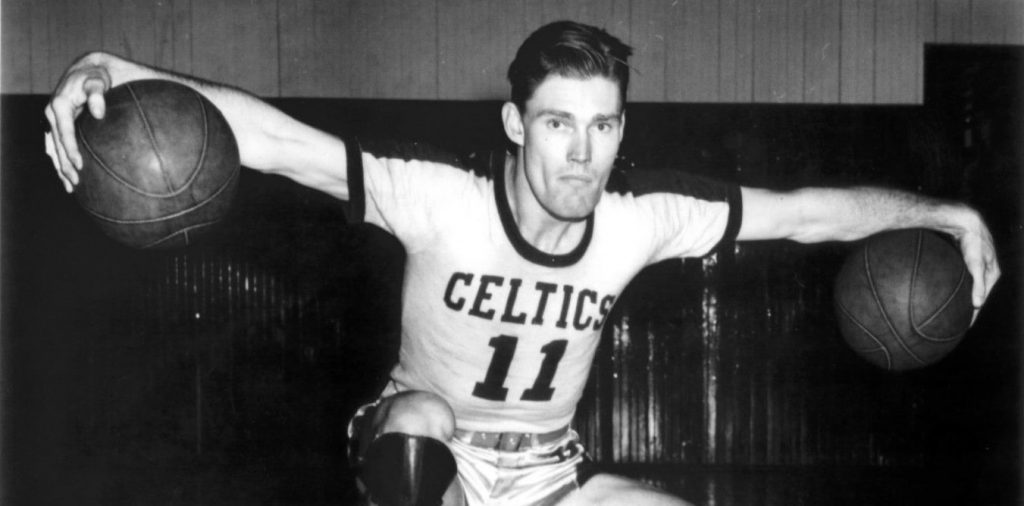
Basketball Career
Once discharged from the army, Chuck joined the Boston Celtics of the Basketball Association of America. He spent two years in Boston, and in the first home game, he became the first basketball player to break the backboard. He threw the ball towards the rim and hit the glass of the backboard which immediately broke. However, it was the glass that was installed improperly which resulted in breaking at a tiny pressure. However, Chuck became a legend that day.
Baseball Career
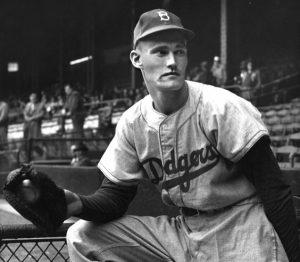
He left Boston to play baseball for the Brooklyn Dodgers, but after playing in only one game in the major league and a couple of seasons in minor leagues, Chuck left the Dodgers and joined the Chicago Cubs. His playing time increased, but after only one season he was again sent to the minor leagues, this time to play for the Los Angeles Angels. This turned out to be a turning point in his life; while playing for the Los Angeles Angels, he was spotted by an MGM casting director, and in 1952 he became a full-time actor, leaving his career in sports behind him.
Acting Debut
He was cast in the film “Pat and Mike” in 1952, as a Police Captain; although it was only a minor role, Chuck got enough encouragement to seek other roles; he continued with minor roles, securing appearances in such projects as “Hold Back the Night”, “Death in Small Doses”, and “The Hired Gun”, among others.
Rise to Stardom
He came to prominence in the late ’50, with the role of Lucas McCain in the highly-acclaimed TV series “The Rifleman” (1958-1963), co-starring with Johnny Crawford in this particular series which celebrated both of them – the two remained good friends until Chuck’s death. He enjoyed success following the end of the series in 1963, continuing his career with the lead role in the adventure film “Flipper” (1963), then portraying Jason McCord in the TV series “Branded” (1965-1966), followed by the lead role in the adventure film “Captain Nemo and the Underwater City” in 1969.
Continuing Success
In the next two decades, Chuck became one of the most famed actors, with roles in such successful films as “Soylent Green” in 1973, “Tourist Trap” (1979), “Summer Camp Nightmare” (1987) among many others, which only further increased his net worth.
Last Years
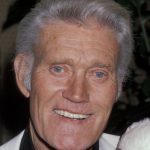
Before Chuck passed away in 1992, he appeared in several more films such as “The Gambler Returns: The Luck of the Draw” in 1991, starring Kenny Rogers, Rick Rossovich and Reba McEntire, and in the action film “Three Days to a Kill” in 1992, his final on-screen appearance.
Do You Know How Rich Chuck Connors Was?
With more than 130 roles, Chuck earned himself quite a decent fortune – let’s just see exactly how much. According to sources, Chuck’s net worth is estimated at $5 million. Some of the most profitable films in which he appeared include “Move Over, Darling” (1963), and “Old Yeller” (1957), which contributed significantly to his net worth.
Marriages, Love Life and Death
Chuck married and divorced three times; his first wife was Elizabeth Jane Riddell from 1948 until the early ‘60s; the couple had four children together. In 1963 he married Indian actress Kamala Devi; their marriage lasted until 1972. Five years later he married actress Faith Quabius but their marriage lasted only for three years. At the time of his death, Chuck was in a relationship with Rose Mary Grumley.
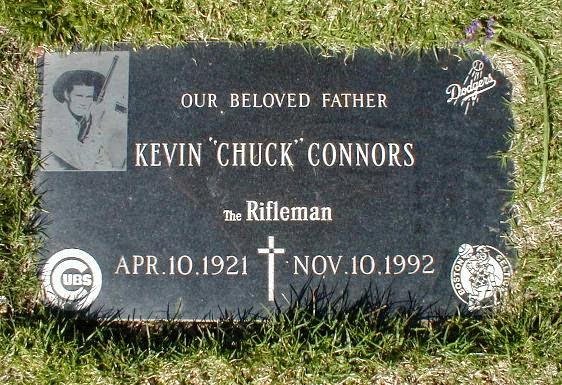
Charitable Work
During his life Chuck had found numerous ways to give back to the community his share; he started the Chuck Connors Charitable Foundation, through which he organized numerous charity events, including the Golf Tournament, held at Canyon Country Club in Palm Springs, California every year. All that would be raised would be given to Angel View Crippled Children’s Foundation.
Russian Connection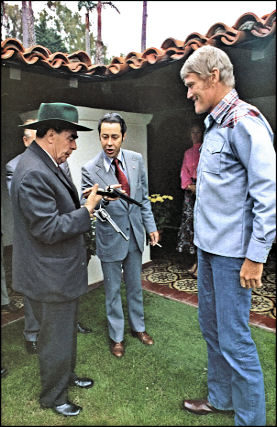
The series “The Rifleman”, made Chuck popular around the world, including Russia. This opened the doors to the Soviet Union and developed a close friendship with Leonid Brezhnev, the leader of the Soviet Union at the time.
Heavy Smoker
Chuck took up smoking in the ‘40s, and would often smoke two packs of cigarettes per day. This led to a lung cancer, and ultimately his death on the 10th November 1992, at Cedars-Sinai Medical Center in Los Angeles. His remains were interred in the San Fernando Mission Cemetery in Los Angeles.
General Info
| Full Name | Chuck Connors |
| Date Of Birth | April 10, 1921 |
| Died | November 10, 1992, Los Angeles, California, United States |
| Height | 1.97 m |
| Weight | 86 kg |
| Profession | Screenwriter, Basketball player, Actor, Baseball player |
| Education | Seton Hall University, Adelphi University |
| Nationality | American |
Family
| Spouse | Faith Quabius, Kamala Devi, Elizabeth Riddell |
| Children | Jeff Connors, Kevin Connors, Steve Connors, Mike Connors |
| Parents | Allan Connors, Marcella Connors |
| Siblings | Gloria Connors |
Accomplishments
| Music Groups | The Upsetters |
| Movies | Soylent Green, The Big Country, Old Yeller, Pat and Mike, Tourist Trap, South Sea Woman, Ride Beyond Vengeance, The Proud and Damned, Geronimo, Airplane II: The Sequel, Move Over, Darling, Kill Them All and Come Back Alone, Captain Nemo and the Underwater City, Trouble Along the Way, Flipper, Tomaha... |
| TV Shows | Werewolf, The Yellow Rose, Cowboy in Africa, Branded, Arrest and Trial, The Rifleman, Roots |
Social profile links
Marks
| # | Marks / Signs |
|---|---|
| 1 | His rifle. |
| 2 | Brooklyn accent. |
| 3 | Deep commanding voice |
| 4 | Strong jawline and bold blue eyes |
| 5 | Towering height and athletic physique |
Salary
| Title | Salary |
|---|---|
| Cowboy in Africa (1967) | $25,000 /week (1967) |
| Branded (1965) | $12,000 /week + percentage |
| Arrest and Trial (1963) | $7,500 /week |
Quotes
| # | Quote |
|---|---|
| 1 | [About being a rugged sports player before he became a rugged leading man] I'm in about as good shape as when I quit baseball in 1952. |
| 2 | [In 1958] You're doing fine work. That pitch was right in there. |
| 3 | [of Barry Goldwater who suggested he try for the Senate in February 1967 during a conversation at the Tucson National Country Club] I was in the foursome in front of him and Arnold Palmer. We've met several times before and we were talking about Ronnie's [Ronald Reagan] election and politics in general when the senator said I should run for the Senate. I was flattered. I told him I didn't think it would be possible. He told me I might change my mind later on. |
| 4 | There were two things wrong with me. I had a crew cut and I've never been on a horse. I did something about it. I let my hair grow and I shopped around for a horse. |
| 5 | [on the cancellation of The Rifleman (1958)] I knew what [The Lucy Show (1962)] would do to our ratings and I didn't want to wait around until our show was dropped and I might be an actor nobody wanted. The show would have gone five years, and that's long enough. By that time, you have done everything possible with your characters. If you keep on going, you're just cheating the public. |
| 6 | [on his popularity while playing the 40-something Lucas McCain on The Rifleman (1958)] What did I find out? That the concept of "Rifleman" is sound. I asked if people wanted any changes. Most of them said to leave it as it is. I asked if they wanted Lucas McCain to marry. They said no. |
| 7 | [In 1961] I've been wanting to do a movie. I've had some offers, but they always wanted me to play the same kind of character as Lucas McCain [The Rifleman (1958)]. So I turned the pictures down, including The Alamo (1960). People see me for free every week as Lucas; why would they pay to see me in the same type of role? |
| 8 | [In 1953] I owe baseball all that I have and much of what I hope to have. Baseball made my entrance to the film industry immeasurably easier than I could have made it alone. To the greatest game in the world I shall be eternally in debt. |
| 9 | [on how he landed the starring role in South Sea Woman (1953)] I had done just a couple of pictures, and I was sitting outside a little dressing room at Warner Bros, and they were testing a lot of people [for the role of Pvt. Davie White] and I was sitting in my Marine uniform waiting to be called and I went out to get a breath of fresh air, when down the street comes Burt Lancaster in a Marine uniform. And in those days the stars never tested with the actors. So I said to him, "Mr. Lancaster what are you doing here?" And he was a baseball fan, so he just decided to come down and test with me. So he took me in the dressing room to, as he said, "run the lines", and I didn't even know what that expression meant then. Finally I figured him out and I said, "Oh, you mean you want to practice?" So anyhow we read the scene and man he looked at me and said, "Boy we've got to work on this!" About then my name is called on the loudspeaker to come in on stage and Burt goes to the door and yells out to the people, "Hey, I'm talking here, we'll be another 20 minutes, go ahead and test somebody else". Well he went over that scene, seven pages long, to give me some semblance of approaching it proper. And then I went in and did it and got the part. But Burt took that time on his own and I gotta give him credit. |
| 10 | [on working in Pat and Mike (1952)] They paid me $500 for my week's work in that movie. I figured they'd made some mistake on the adding machine, but I stuck the check in my pocket and shut up. Baseball, I told myself, just lost a first baseman. |
| 11 | I'm more than satisfied to stay put in Los Angeles. The Coast League is one of the best leagues in baseball and the living and playing conditions are superior. |
| 12 | I have only five days to win the job. So I can't take time out for injuries. |
| 13 | [regarding his baseball career] I was a switch-hitter, remember? At most things, I'm a good with one hand as the other. |
| 14 | [In 1988] Somebody would like to have that [my agent]. He'll take that instead of commission. |
| 15 | [comparing his baseball and acting careers] So why not be a switch hitter with the rifle, too? Let's learn both ways. |
| 16 | [In 1960] What's cost? This is insurance. At what we pay Connors, what will it cost if he's crippled? |
| 17 | [on his first introduction to Johnny Crawford, who was auditioning to play his son Mark in The Rifleman (1958)] I remember the first time I saw him, I was sitting there with the producer and we were interviewing kids to play Mark. We must have interviewed 20 or 30, then Johnny came in and before we even talked to him I said, "That's him, that's The Rifleman's son". |
| 18 | [In 1987 about playing the lead in Werewolf (1987)] It's played very straight and dramatically, but with a tinge of black humor, I play evil incarnate, a 1,600-year-old man in full control of his werewolfism. Janos will kill and eat anybody and anything. Eric, on the other hand, kills only bad people in defense of his own life or those of innocent victims. |
| 19 | [In 1992, about being typecasted because of The Rifleman (1958)] If you're ever being typecasted--as most of us are-- that's a great way to be typecasted. So, "The Rifleman" is still popular with a lot of people, and I'm proud to be associated. |
| 20 | [In 1989] I was a bum of a hitter just not cut out for the majors. But, I will never forget Stan's kindness. When he finished watching me cut away at the ball, Stan slapped me on the back and told me to keep swinging. |
| 21 | [About the character he was best-known for] I can never get rid of The Rifleman (1958), and I don't want to. It's a good image. Basically, [the show] was the simplicity of the love between the father and the son. That was the foundation. The rifle was for show, but the relationship was for real. There was some violence, but at the end, I would explain to the boy that the violence was not something we wanted to do, but had to do. |
| 22 | Now who goes to the games in LA? Producers, directors, writers, casting directors. So because of the good year, I became a kind of favorite of the show business people, unbeknownst to myself. |
| 23 | [on his Lucas McCain character] Lucas was a righteous character, despite all the violence. We had the benefit of the father-son relationship, so I could have a little scene at the end of the show where I would explain to Mark, essentially, that sometimes violence is necessary, but it isn't good. And there was a lot of violence on The Rifleman (1958). We once figured out that I killed on the average of two and a half people per show. That's a lot of violence, but it was always covered by the scene with the little boy. And he would say, in essence, "Gee, you won Pa". And I would say, "Wait a minute son. You never win when you kill someone. It demeans you, it takes something away. People have got to learn to do away with violence and guns, and to love each other". And the viewers would forget the fact that I had killed three people during the show, because of the tender epilogue with Mark [Johnny's favorite scenes]. The warm father-son relationship was the heart of the program, and not only did we perform it, but Johnny and I became very close friends. |
| 24 | [Of Johnny Crawford] When Johnny came on the set in 1958, he was a little 12-year-old boy. He called everyone in the cast or crew "Sir" or "Ma'am". During the course of the five years of our run, he had two hit records, and he was nominated for an Emmy for Best Supporting Actor. And yet, when the show was finished after five seasons, Johnny went around and thanked everyone in the cast and crew, and he still called them "Sir" or "Ma'am". |
| 25 | Well, it isn't because I'm the fidgety guy, seriously, I have to sit there like a mummy you can't move. Regular makeup you can turn around and I sit there like that, and the worst part of it is, after working 14 hours, I can't just take it off, I have to sit for another hour because of the way they made these appliances, and they have to be taken out very slowly. |
| 26 | [on The Rifleman (1958)'s theme song] I hear the same thing everywhere I go. |
| 27 | [In 1973] The President gave me about two dozen presidential tie clips and ladies' pins, with instructions to spread them around when I thought it appropriate, Brezhnev [Soviet leader Leonid Brezhnev] will get more than a tie clip. I've ordered two engraved Colt revolvers for the General Secretary, Brezhnev is quite a western buff. |
| 28 | I don't want my kids growing up believing that there is nothing destructive in the world. I want them to know that there is good and bad in the world, that you can be hurt physically, that guns can kill you, that drugs are bad for you, that not everyone means well. |
Facts
| # | Fact |
|---|---|
| 1 | He was most widely known to be a social butterfly. |
| 2 | On The Rifleman (1958), his character had used a lot of rifles, in real-life, he owned rifles. |
| 3 | Connors wasn't the only baseball star to appear on The Rifleman (1958), a couple of former baseball stars appeared on that show were: Duke Snider and Don Drysdale. |
| 4 | He smoked three packs of Camel cigarettes a day until the 1970s. |
| 5 | Took part in a parade in New York in support of the Vietnam War in 1967, and campaigned for his friend Ronald Reagan. |
| 6 | Was a Boy Scout. |
| 7 | Was a member of the Sheriff's Advisory Board of Orange County, California. |
| 8 | He joined the Brooklyn Dodgers in 1949. |
| 9 | Connors was one of only twelve athletes in history to have played for both Major League Baseball and in the NBA. |
| 10 | Appeared on the front cover of TV Guide five times. |
| 11 | Acting mentor and friend of Johnny Crawford. |
| 12 | His father was born in Dunville and his mother in St. Marys, Placentia Bay, both in the Dominion of Newfoundland (now Canada). They were both of Irish descent. |
| 13 | Almost one year before his death, his first wife, Elizabeth "Betty" Connors, died on February 27, 1992, after a long illness. |
| 14 | Chuck Connors died on November 10, 1992, at 71. A couple of years before his death, he was devastated to hear about Burt Lancaster's stroke. He tried calling his office one day, but his office wasn't releasing any information at that time. Connors sent a letter in support of David Fury's nomination of Lancaster to the Cowboy Hall of Fame and signed the petition David sent to the American film Institute nominating Burt for the Lifetime Achievement Award in 1991. |
| 15 | Future The Rifleman (1958) co-star, longtime friend and devoted fan, Johnny Crawford, had once said in an interview that when he was just a little boy, he too was an avid baseball fan, like Connors was, and would bring his baseball equipment whenever both he and Connors would be on location, during filming. |
| 16 | Future comedians, Bill Rafferty and Vicki Lawrence, announcers Burton Richardson and Randy West, actors David Cassidy, Kathy Garver, Clarence Gilyard Jr., Bill Mumy, and talk show hostess, Oprah Winfrey describes him as one of their childhood television heroes. |
| 17 | Future actor LeVar Burton was also said to be a huge fan of Connors' series The Rifleman (1958), as a little boy. |
| 18 | Before he was an actor, he was a professional basketball and baseball player. |
| 19 | After he won a scholarship attending a private high school, he played basketball, football & baseball. |
| 20 | Had won numerous scholarships while in high school, but chose to attend Seton Hall College (now Seton Hall University). |
| 21 | His college studies were interrupted when he was enlisted in the United States Army in 1942 in Fort Knox, Kentucky. |
| 22 | Resumed his sports career after the war had ended. Connors had no choice other than to play professional basketball, when he continued to play baseball. |
| 23 | He had 10 hobbies: golfing, riding horses, reading, swimming, fishing, poetry writing, spending time with his family, baseball, philanthropy and politics. |
| 24 | Was best friends with: James Drury, Doug McClure, John Smith, Adam West, Jerry Lewis, Angela Lansbury, Joey Bishop, Regis Philbin, Paul Fix, Fess Parker, Gregory Peck, Alex Cord, James Arness, Peter Graves, Michael Landon, Robert Reed, Bob Hope, Frank Sinatra, Sammy Davis Jr., Dean Martin, Alvy Moore, Dabbs Greer, Richard Anderson, Gene Barry, Bill Quinn, Charlton Heston, Aaron Spelling, Tom Helmore, Richard Nixon, Burt Lancaster, James Stewart, Mickey Rooney, Julie Adams, Jeff York, Aldo Ray, Gerald Ford and Leonid Brezhnev. |
| 25 | His parents were Allan Connors, who was a longshoreman and Marcella Lundrigan Connors, a housewife. |
| 26 | Before he was an actor, he spent most of the war as a tank-warfare instructor in Camp Campbell, Kentucky, before West Point, New York. |
| 27 | Future talk show hosts - his friend, Regis Philbin and Arsenio Hall, were once said to be their admirable television heroes. Philbin was a young adult while Hall was just a child. |
| 28 | He was awarded a Star on the Hollywood Walk of Fame at 6838 Hollywood Boulevard in Hollywood, California on July 18, 1984. |
| 29 | At age 13, he remembered he was a lousy first baseman, and the man who made the biggest impact on his life was his coach on a team called the Celtics, a diminutive gent named John Flynn. |
| 30 | Years after The Rifleman (1958), he was a spokesperson for the United States Bureau of Alcohol, Tobacco and Firearms in the early 1970s. |
| 31 | His father, Allan died in 1966, followed by his mother, Marcella, who died in 1971. |
| 32 | Graduated from Adelphi Academy - a private high school in Brooklyn, New York, in 1940. |
| 33 | His series The Rifleman (1958) was canceled at the end of the fifth season, because both the actor himself and co-star Johnny Crawford had decided to move on to other projects. |
| 34 | Remained good friends with Johnny Crawford during and after The Rifleman (1958). |
| 35 | Best remembered by the public for his starring role as Lucas McCain on The Rifleman (1958). |
| 36 | Biography in: "The Scribner Encyclopedia of American Lives." Volume 3, 1991-1993, pp. 116-118. New York: Charles Scribner's Sons, 2001. |
| 37 | Was a film "enemy" of Charlton Heston at least twice -- as Buck Hannesey in The Big Country (1958) and as Tab Fielding in Soylent Green (1973). |
| 38 | In June 1973, he befriended Soviet Secretary General Leonid Brezhnev in a meeting at the White House. Connors traveled to the Soviet Union in December 1973, and presented Brezhnev with two Colt revolvers. In 1982, he asked his friend President Ronald Reagan if he could attend Brezhnev's funeral service, but he was not allowed to be part of the official US delegation. |
| 39 | A longtime smoker, he was hospitalized with pneumonia three weeks before his death. |
| 40 | He was a staunch supporter of the Republican Party as well as a frequent guest at the White House during the administration of his close friend President Richard Nixon. |
| 41 | Was an altar boy and parishioner at Our Lady of Perpetual Help Church in Bay Ridge, Brooklyn. |
| 42 | Before the 1940 baseball season, he was signed by the Brooklyn Dodgers as an amateur free agent. |
| 43 | On October 10, 1950, he was traded by the Brooklyn Dodgers - with whom he had appeared with in one game in 1949 - with Dee Fondy to the Chicago Cubs for Hank Edwards and cash. He spent part of the 1951 season with the Cubs. |
| 44 | Accepted the role of Mr. Slausen in Tourist Trap (1979) because he wanted to "become the Boris Karloff of the '80s". |
| 45 | He was the first NBA player to shatter a backboard; he did it while playing for the Boston Celtics in 1946. |
| 46 | Lucas McCain, Connors' character on The Rifleman (1958), was ranked #32 in TV Guide's list of the "50 Greatest TV Dads of All Time" [20 June 2004 issue]. |
| 47 | Inducted into the Hall of Great Western Performers of the National Cowboy and Western Heritage Museum in 1991. |
| 48 | In a 1997 biography titled "The Man Behind the Rifle", author David Fury says that "Chuck" Connors acquired his nickname while an athlete playing first base. He had a habit of calling to the pitcher: "Chuck it to me, baby, chuck it to me!". |
| 49 | Was elected to the Cowboy Hall of Fame in 1991. |
| 50 | Very likely the only guest commentator on Monday Night Baseball to use the F-word. |
| 51 | Almost suffered the same fate in each of his two television westerns. On a 10-2-61 episode of The Rifleman (1958) called "The Vaqueros", he was stripped to the waist, tied to a tree and left to die under a scorching sun by a group of Mexican bandits. On an 11-14-65 episode of Branded (1965) called "Fill No Glass for Me", he was stripped to the waist, tied to a tree and left to die under a scorching sun by a group of Indian warriors (in both cases he survived). |
| 52 | According to an article on television westerns in Time Magazine (March 30, 1959), Connors stood 6'5" tall, weighed 215 pounds, and had chest-waist-hips measurements of 45-34-41. |
| 53 | Chuck Person, an NBA Player, is named after him. |
| 54 | Four sons; Mike Connors, Jeff Connors, Steve Connors, Kevin Connors. |
| 55 | Connors also played professional basketball with the Boston Celtics. |
| 56 | Played major league baseball (for the Chicago Cubs) in 1951. |
Pictures
Movies
Actor
| Title | Year | Status | Character |
|---|---|---|---|
| Fast Backwards | 2001 | Short | The Star |
| A Man Who Fell from the Sky | 2001 | Narrator and host | |
| Three Days to a Kill | 1992 | Capt. Damian Wright | |
| The Gambler Returns: The Luck of the Draw | 1991 | TV Movie | Lucas McCain |
| Salmonberries | 1991 | Bingo Chuck | |
| Face the Edge | 1990 | Buddy | |
| Guns of Paradise | 1989-1990 | TV Series | Gideon McKay |
| Last Flight to Hell | 1990 | Red Farley | |
| High Desert Kill | 1989 | TV Movie | Stan Brown |
| Wolf | 1989 | TV Series | |
| Skinheads | 1989 | Mr. Huston | |
| Trained to Kill | 1989 | Ed Cooper | |
| Taxi Killer | 1988 | ||
| Murder, She Wrote | 1985-1988 | TV Series | Tyler Morgan / FBI Agt. Fred Keller |
| Terror Squad | 1988 | Chief Rawlings | |
| Once Upon a Texas Train | 1988 | TV Movie | Nash Crawford |
| Maniac Killer | 1987 | Professor Roger Osborne | |
| Werewolf | 1987 | TV Series | Janos Skorzeny Captain Janos Skorzeny |
| Summer Camp Nightmare | 1987 | Mr. Warren | |
| Sakura Killers | 1987 | The Colonel (as Chuck Conners) | |
| Eroi dell'inferno | 1987 | Senator Morris | |
| The All American Cowboy | 1985 | TV Movie | |
| Spenser: For Hire | 1985 | TV Series | King Powers |
| The Yellow Rose | 1983-1984 | TV Series | Jeb Hollister |
| Afghanistan pourquoi? | 1983 | Soviet colonel | |
| The Love Boat | 1983 | TV Series | Roy |
| Kelsey's Son | 1983 | TV Movie | Boone Kelsey |
| Balboa | 1983 | Alabama Dern | |
| Matt Houston | 1983 | TV Series | Castanos |
| Lone Star | 1983 | TV Movie | Jake Farrell |
| The Vals | 1983 | Trish's Father - 'Boom-Boom Girls' Producer | |
| There Was a Little Girl | 1982 | ||
| Airplane II: The Sequel | 1982 | The Sarge | |
| Hit Man | 1982 | Sam Fisher | |
| Fantasy Island | 1982 | TV Series | Frank Barton |
| The Capture of Grizzly Adams | 1982 | TV Movie | Frank Briggs |
| Best of the West | 1982 | TV Series | |
| Bordello | 1981 | Jonathan | |
| Walking Tall | 1981 | TV Series | Theo Brewster |
| Day of Resurrection | 1980 | Capt. McCloud - HMS Nereid | |
| Stone | 1980 | TV Series | Tom Lettleman |
| Day of the Assassin | 1979 | Fleming | |
| Tourist Trap | 1979 | Mr. Slausen | |
| Standing Tall | 1978 | TV Movie | Major Roland Hartline |
| The Night They Took Miss Beautiful | 1977 | TV Movie | Mike O'Toole |
| Roots | 1977 | TV Mini-Series | Tom Moore |
| Police Story | 1973-1976 | TV Series | Lt. Lew Randle / Sergeant Ed 'Bugs' Pebbles / Sergeant Barrett / ... |
| Nightmare in Badham County | 1976 | TV Movie | Sheriff Danen |
| Banjo Hackett: Roamin' Free | 1976 | TV Movie | Sam Ivory |
| The Six Million Dollar Man | 1975 | TV Series | Niles Lingstrom |
| Il lupo dei mari | 1975 | Wolf-Larsen | |
| 99 and 44/100% Dead | 1974 | Claw Zuckerman | |
| Here's Lucy | 1973 | TV Series | Chuck Connors |
| Soylent Green | 1973 | Tab Fielding | |
| The Mad Bomber | 1973 | William Dorn | |
| The Horror at 37,000 Feet | 1973 | TV Movie | Captain Ernie Slade |
| Set This Town on Fire | 1973 | TV Movie | Buddy Bates |
| Night Gallery | 1972 | TV Series | Roderick Blanco |
| Pancho Villa | 1972 | Col. Wilcox | |
| Night of Terror | 1972 | TV Movie | Brian DiPaulo |
| The Proud and Damned | 1972 | Will Hansen | |
| Embassy | 1972 | Kesten | |
| The Birdmen | 1971 | TV Movie | Colonel Morgan Crawford |
| Support Your Local Gunfighter | 1971 | 'Swifty' Morgan (uncredited) | |
| The Devil's Backbone | 1971 | Reynolds | |
| The Name of the Game | 1971 | TV Series | Governor Brill |
| The Virginian | 1971 | TV Series | Gustaveson |
| Captain Nemo and the Underwater City | 1969 | Senator Robert Fraser | |
| Kill Them All and Come Back Alone | 1968 | Clyde McKay | |
| Cowboy in Africa | 1967-1968 | TV Series | Jim Sinclair |
| Branded | 1965-1966 | TV Series | Jason McCord |
| Ride Beyond Vengeance | 1966 | Jonas Trapp, the Tiger | |
| Synanon | 1965 | Ben | |
| Arrest and Trial | 1963-1964 | TV Series | John Egan |
| Move Over, Darling | 1963 | Stephen 'Adam' Burkett | |
| Flipper | 1963 | Porter Ricks | |
| The Rifleman | 1958-1963 | TV Series | Lucas McCain / Earl Bantry |
| Geronimo | 1962 | Geronimo | |
| The DuPont Show with June Allyson | 1960 | TV Series | George Aswell |
| The Big Country | 1958 | Buck Hannassey | |
| The Adventures of Jim Bowie | 1958 | TV Series | Cephas K. Ham |
| Zane Grey Theater | 1958 | TV Series | Lucas McCain |
| Love That Jill | 1958 | TV Series | Cliff |
| Date with the Angels | 1958 | TV Series | Stacey L. Stacey |
| Hey, Jeannie! | 1958 | TV Series | Buck Matthews |
| Old Yeller | 1957 | Burn Sanderson | |
| The Restless Gun | 1957 | TV Series | Toby Yeager |
| The Lady Takes a Flyer | 1957 | Phil Donahoe | |
| Wagon Train | 1957 | TV Series | Private John Sumter |
| General Electric Theater | 1954-1957 | TV Series | Long Jack / Soldier |
| The Silent Service | 1957 | TV Series | Liddell |
| The Hired Gun | 1957 | Judd Farrow | |
| Death in Small Doses | 1957 | Mink Reynolds | |
| Tales of Wells Fargo | 1957 | TV Series | Sam Bass / Button Smith / Pete Johnson |
| Designing Woman | 1957 | Johnnie 'O' | |
| The Millionaire | 1957 | TV Series | Hub Grimes |
| Tomahawk Trail | 1957 | Sgt. Wade McCoy | |
| Big-Foot Wallace | 1957 | TV Movie | Big Foot Wallace |
| The Gale Storm Show: Oh! Susanna | 1956 | TV Series | Ooma |
| West Point | 1956 | TV Series | Maj. Neilson / Maj. Nielson |
| Crossroads | 1956 | TV Series | Lou Brissie |
| The Joseph Cotten Show: On Trial | 1956 | TV Series | Andy |
| Hold Back the Night | 1956 | Sgt. Ekland | |
| Climax! | 1956 | TV Series | |
| Hot Rod Girl | 1956 | Det. Ben Merrill | |
| Gunsmoke | 1956 | TV Series | Sam Keeler |
| Walk the Dark Street | 1956 | Frank Garrick | |
| The Star and the Story | 1955-1956 | TV Series | Attendant / Harry Frazier |
| Frontier | 1956 | TV Series | Thorpe Henderson |
| Jane Wyman Presents The Fireside Theatre | 1956 | TV Series | Officer Handley |
| Cavalcade of America | 1955 | TV Series | Harry |
| Matinee Theatre | 1955 | TV Series | |
| Good Morning, Miss Dove | 1955 | Bill Holloway | |
| Screen Directors Playhouse | 1955 | TV Series | Art Shirley |
| Three Stripes in the Sun | 1955 | Idaho Johnson | |
| Target Zero | 1955 | Pvt. Moose | |
| Adventures of Superman | 1955 | TV Series | Sylvester J. Superman |
| Schlitz Playhouse | 1955 | TV Series | Stanley O'Connor |
| Private Secretary | 1955 | TV Series | Mr. Neanderthal |
| TV Reader's Digest | 1955 | TV Series | Charlie Masters |
| City Detective | 1955 | TV Series | Sam |
| Four Star Playhouse | 1954-1955 | TV Series | Stan / Mervyn |
| The Loretta Young Show | 1955 | TV Series | Jess Hayes |
| Big Town | 1954 | TV Series | |
| Naked Alibi | 1954 | Capt. Owen Kincaide | |
| The Human Jungle | 1954 | Earl Swados | |
| Dear Phoebe | 1954 | TV Series | Rocky |
| Dragonfly Squadron | 1954 | Capt. Warnowski | |
| South Sea Woman | 1953 | Pvt. Davey White | |
| Code Two | 1953 | Deputy Sheriff (uncredited) | |
| Trouble Along the Way | 1953 | Stan Schwegler | |
| The Silver Whip | 1953 | Minor Role (uncredited) | |
| Your Jeweler's Showcase | 1953 | TV Series | |
| Pat and Mike | 1952 | Police Captain | |
| Wake Island | 1942 | Soldier in meal queue (uncredited) |
Writer
| Title | Year | Status | Character |
|---|---|---|---|
| Branded | 1966 | TV Series story - 2 episodes | |
| The Rifleman | TV Series story - 3 episodes, 1959 - 1961 story idea - 1 episode, 1959 |
Director
| Title | Year | Status | Character |
|---|---|---|---|
| There Was a Little Girl | 1982 | as Martin Herbert |
Self
| Title | Year | Status | Character |
|---|---|---|---|
| Later with Bob Costas | 1989 | TV Series | Himself |
| The Pat Sajak Show | 1989 | TV Series | Himself - Guest |
| The Late Show | 1987 | TV Series | Himself - Guest |
| All-Star Party for 'Dutch' Reagan | 1985 | TV Special | Himself |
| Our Time | 1985 | TV Series | Himself |
| The Steel Collar Man | 1985 | TV Special | J.G. Willis |
| The Great Mysteries of Hollywood | 1981 | TV Series documentary | Himself - Host |
| When the West Was Fun: A Western Reunion | 1979 | TV Movie documentary | Himself |
| ABC's Silver Anniversary Celebration | 1978 | TV Special | Himself |
| NBC Special Treat | 1976 | TV Series | Himself - Host |
| The Dean Martin Show | 1974 | TV Series | Himself |
| Chuck Connors in the U.S.S.R. | 1973 | TV Movie documentary | Himself |
| The Sonny and Cher Comedy Hour | 1973 | TV Series | Himself / Various Characters |
| Thrill Seekers | 1973 | TV Series | Himself - Host |
| The David Frost Show | 1971 | TV Series | Himself - Guest |
| Once Upon a Wheel | 1971 | Documentary | Himself |
| The Tonight Show Starring Johnny Carson | 1971 | TV Series | Himself |
| The Don Knotts Show | 1970 | TV Series | Himself |
| The Merv Griffin Show | 1967-1970 | TV Series | Himself - Guest |
| The Joey Bishop Show | 1967-1969 | TV Series | Himself / Himself - Guest Host |
| The Beautiful Phyllis Diller Show | 1968 | TV Series | Himself - Guest |
| The Don Rickles Show | 1968 | TV Series | Himself |
| The Jackie Gleason Show | 1968 | TV Series | Himself |
| Western, Italian Style | 1968 | TV Short documentary | Himself |
| Dateline: Hollywood | 1967 | TV Series | Himself |
| The Mike Douglas Show | 1966 | TV Series | Himself - Guest Host |
| The Hero | 1966 | TV Series | Himself |
| 76th Annual Tournament of Roses Parade | 1965 | TV Movie | Himself |
| Here's Hollywood | 1961-1962 | TV Series | Himself |
| Password All-Stars | 1961 | TV Series | Himself |
| Person to Person | 1961 | TV Series documentary | Himself |
| The Chevy Show | 1960 | TV Series | Himself |
| The Dinah Shore Chevy Show | 1960 | TV Series | Himself |
| What's My Line? | 1959-1960 | TV Series | Himself - Guest Panelist |
| The 12th Annual Primetime Emmy Awards | 1960 | TV Special | Himself |
| The Big Party | 1959 | TV Series | Himself |
| The Steve Allen Plymouth Show | 1958 | TV Series | Himself |
| The Ed Sullivan Show | 1957 | TV Series | Himself |
| Boy with a Knife | 1956 | Documentary short | Bud Williams (uncredited) |
Archive Footage
| Title | Year | Status | Character |
|---|---|---|---|
| Longhorns | 2011 | Lucas McCain (uncredited) | |
| Here's Harry: Remembering Gale Gordon | 2011 | Video documentary short | Clip from 'Here's Lucy' |
| Pioneers of Television | 2011 | TV Mini-Series documentary | Himself / Lucas McCain from Rifleman |
| The Western World of Ferdinando Baldi | 2005 | Video documentary | Himself |
| Images of Indians: How Hollywood Stereotyped the Native American | 2003 | TV Movie documentary | Himself / Sgt. Wade McCoy (from Tomahawk Trail (1957)) (uncredited) |
| K.D. Lang Talks with Percy Adlon About 'Percy Adlon's Salmonberries': 11 Years Later | 2001 | Video documentary short | Bingo Chuck (uncredited) |
| Television: The First Fifty Years | 1999 | Video documentary | Lucas McCain |
| Hollywood: The Gift of Laughter | 1982 | TV Movie documentary | Actor - 'Move Over Darling' (uncredited) |
| The Best of Sex and Violence | 1982 | Documentary uncredited | |
| Walt Disney's Wonderful World of Color | 1980 | TV Series | Burn Sanderson |
| Blade Rider, Revenge of the Indian Nations | 1966 | Jason McCord | |
| Broken Sabre | 1965 | Jason McCord |
Awards
Won Awards
| Year | Award | Ceremony | Nomination | Movie |
|---|---|---|---|---|
| 1984 | Golden Boot | Golden Boot Awards | ||
| 1984 | Star on the Walk of Fame | Walk of Fame | Television | On 18 July 1984. At 6838 Hollywood Blvd. |
Source: IMDb, Wikipedia

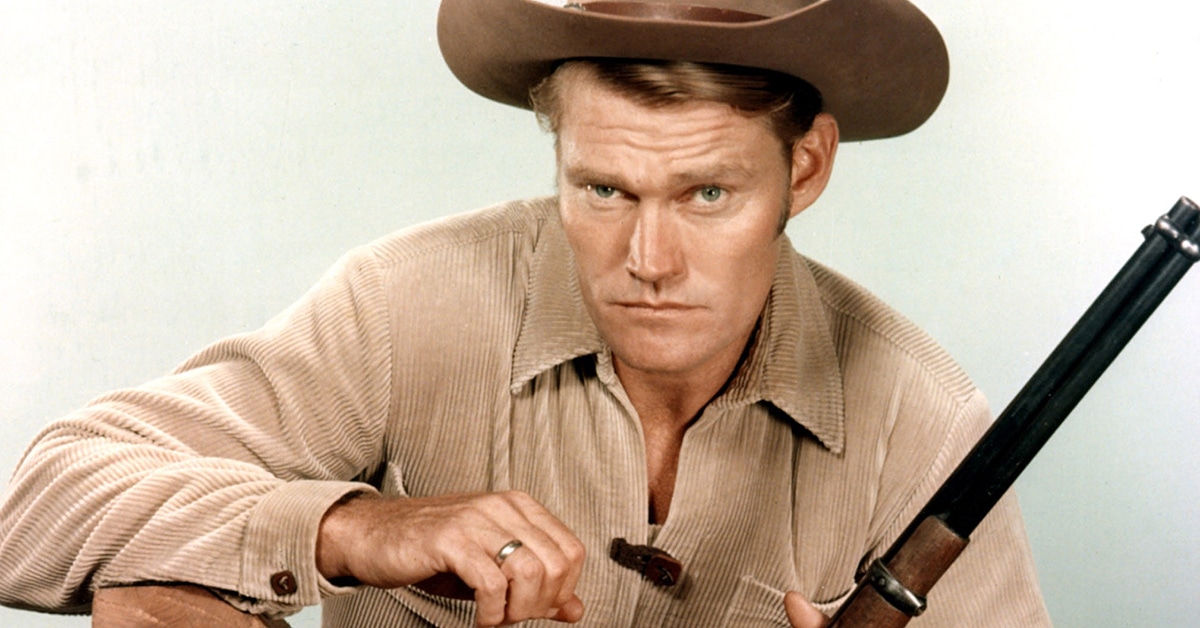
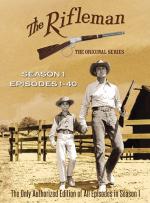
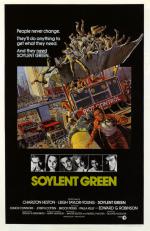
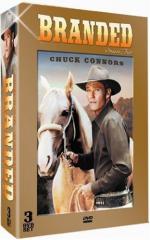
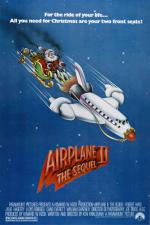

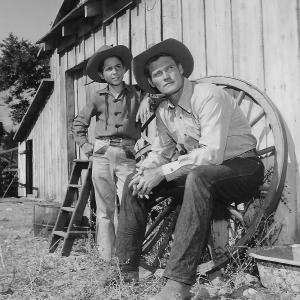
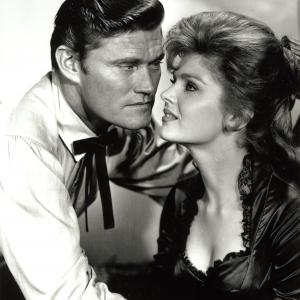
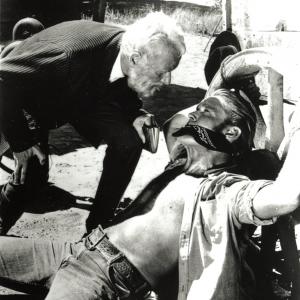
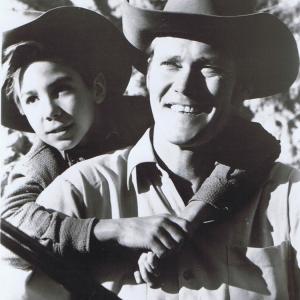
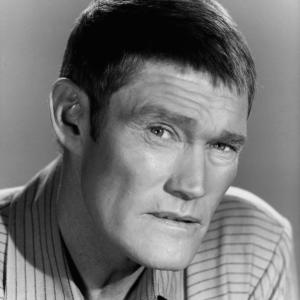
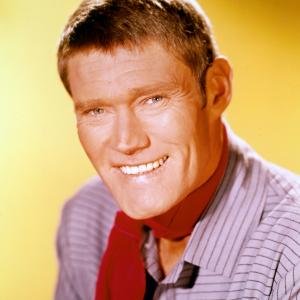
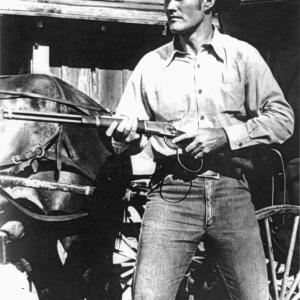
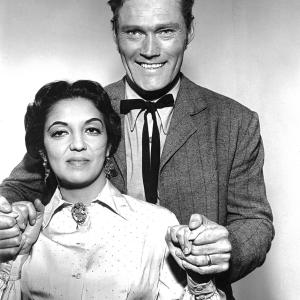
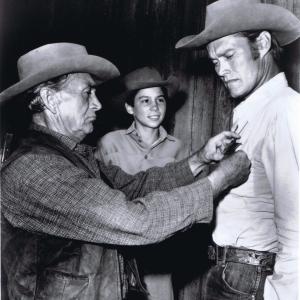
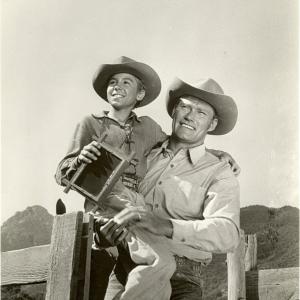



4 Comments
Did chuck connor play for the norfolk tar baseball team.
I was trying to find out CHUCK CONNORS height?
Chuck Conners was 6-foot 6-inches tall.
How can I touch base with Chuck Connors family. Are any still living.?